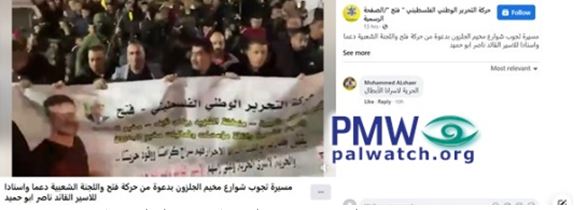"Make sounds of joy, O rifle… Let only the sound of the rifle be heard" announces Fatah at rally for terrorist murderer
Video and text posted on the official Fatah Facebook page
Posted text: “A procession passes through the streets of the Jalazone [refugee] camp in a call by the Fatah Movement and the Popular Front [for the Liberation of Palestine] (PFLP) to support and strengthenprisoner commander Nasser Abu Hmeid (i.e., terrorist, responsible for the murder of 7 people).”
Visual:
The video shows the procession in Jalazone refugee camp north of Ramallah, in which shots are heard being fired in the air in the background while an announcer speaks.
Announcer: “Make sounds of joy, O rifle,
make sounds of joy, make the whole world hear… Let the whole world be silent and let those [Arabs] who are shirking [their duty] be silent. Let only the sound of the rifle be heard… (The following is an excerpt from a poem by Mahmoud Darwish -Ed.) ‘O you whose hands are bloody, the night will pass, the prison cell will not remain forever, nor the links of the chains… The seeds of dead oats will fill the entire valley with crops.’ Arise, O Nasser Abu Hmeid, arise masked lion of Ramallah, and let all the free people and the whole world know that we will definitely triumph, we will definitely triumph! Victory to the prisoners! Freedom to the prisoners! Healing to the wounded! Mercy to the Martyrs!”
